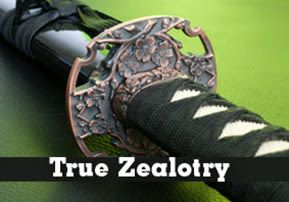
Pinchas: True Zealotry
Pinchas corrected Zimri's aberration and reconnected us with our mission of bringing sanctity to the world; his motivation was pure as seen by the outcome...

What does one do when the heart cries out about an injustice? Even when everyone else is silent? Is a call to action simply a reflection of personal frustration or are there moments where passion justifies the feelings of indignity?
The central figure in this week's Torah reading, Pinchas, witnessed Zimri, the prince of the tribe of Shimon taking and cohabitating with a Midianite woman. He was infuriated about the desecration of the the holiness of the Jewish people and, ultimately, Hashem's honor. He then asked Moses if he was allowed to revenge the wrong and he was told that he himself should respond. Taking a spear, he killed both of them in an act of purely motivated revenge. His actions, however, caused personal derision from the members of the tribe of Shimon who mocked this showing of zealotry. Hashem responded and testified on Pinchas' behalf, praising  his response and rewarding him with an eternal covenant of peace.
his response and rewarding him with an eternal covenant of peace.
Granted that Zimri's action were despicable, but emotional outbreaks and reactions are, in general, not acceptable according to the Torah. How did Pinchas allow himself this course of action? There is a fascinating and somewhat perplexing law called "The zealous may take revenge". In short, even if the Jewish courts can't take action, an individual may. In the case of Zimri, Zimri himself wasn't liable for death at the hands of the court, only by someone motivated by the concern for the desecration of Hashem's name. (Please, no one should conclude from this column that acts of revenge are advisable or even acceptable. This is the sole exception where such revenge, when purely motivated, is allowed.)
While writing this I realized that I have chosen a topic which is highly charged. Zealotry, in general, is a dangerous quality. We live in a world where such extremism fills our headlines and news reports. Although the zealots we read about daily are light years from the greatness of Pinchas, even so, we are wary of this sort of activity. Given this concern, let's try to uncover some of the motives of Pinchas and why his actions were considered so praiseworthy.
The Talmud tells us that the First Temple was destroyed due to idolatry, adultery, and murder while the Second Temple was due to senseless hatred. The question is obvious. As serious as pointless hatred may be, how can it be compared to the three cardinal sins? The Nesivos Shalom (Rabbi Shalom Noach Barazovsky OB"M) explains that we shouldn't judge the severity of a sin simply by the punishment it entails. Hatred is not punishable by Jewish court and, yet, it undermines the entire society. In this case the impact and outcome of hatred is a better measuring rod for the severity of the misdeed than its punishment. Drawing a parallel to Pinchas, the prohibition of taking a non-Jewish woman is not the most severe case of adultery in terms of punishment. However, it completely undermines the uniqueness and sanctity of the Jewish people.
Pinchas saw this travesty taking place and couldn't remain silent. His deep concern was motivated solely by his appreciation of the sanctity of the Jewish people. Pinchas only wanted blessing and holiness for the Jewish people and he successfully restored the vision of what the Jewish people are supposed to be.
Hashem, by giving Pinchas a covenant of peace, testified to the purity of his motives. Why was a covenant of peace the appropriate reward? According to the Torah, peace is not a lack of fighting or dissension. True peace is when all elements of a certain unit are all in harmony. As long as Zimri had corrupted the vision of the purity of the Jewish people, peace was impossible. Pinchas corrected this aberration and reconnected us with our mission of bringing sanctity to the world.
Parenthetically, this sort of zealotry is completely different from the vengeful destruction we see around us for a number of reasons. Pinchas' concern was for the sanctity of the Jewish people, surely not to destroy and maim "infidels". Secondly, his motivation was pure as seen by the outcome, peace among the Jewish people. How completely different this is to the continual destruction and hatred we are witnessing by the extremists of today's world. Finally Pinchas only took action when he was assured by no less than Moses himself that his actions were praiseworthy. What should we say about today's so called leaders who are filled with venom and hate?
I have one more thought that comes in the form of a prayer and reflects a sense of anguish shared by many. One of the last stories in the Torah before its conclusion is that of Pinchas. He saw one of the greatest of the Jews of his generation take a non-Jewish woman and was appalled and took action. It's difficult not to draw the parallel to our times when we are living the last "stories" of history, just moments before the coming of the Moshiach (Messiah). What should we say when so many of our dear Jewish brothers and sisters are taking non-Jewish mates and disappearing from the future of Jewish destiny? We are not called upon to take physical action but we can still cry over the tragedy that is befalling so many of our people. True zealotry is a reflection of love for another. Those of us who decry intermarriage are filled with tears of pain and hope that our unaffiliated brethren will connect to the sweetness of Torah and be inspired to lives reflecting the purity and sanctity of the Jewish people.











Tell us what you think!
Thank you for your comment!
It will be published after approval by the Editor.